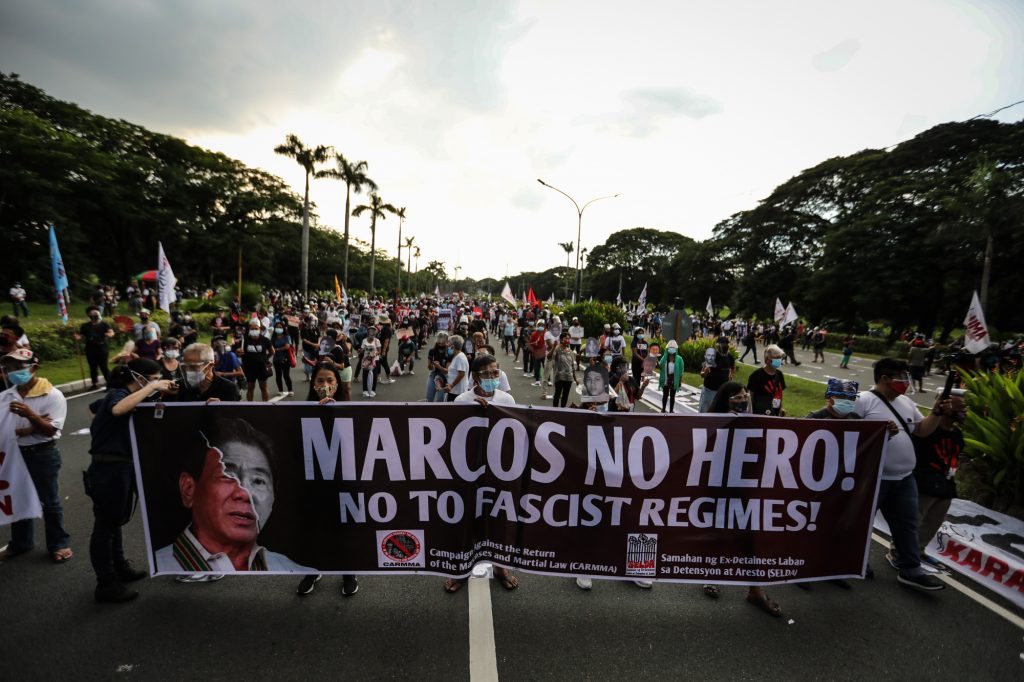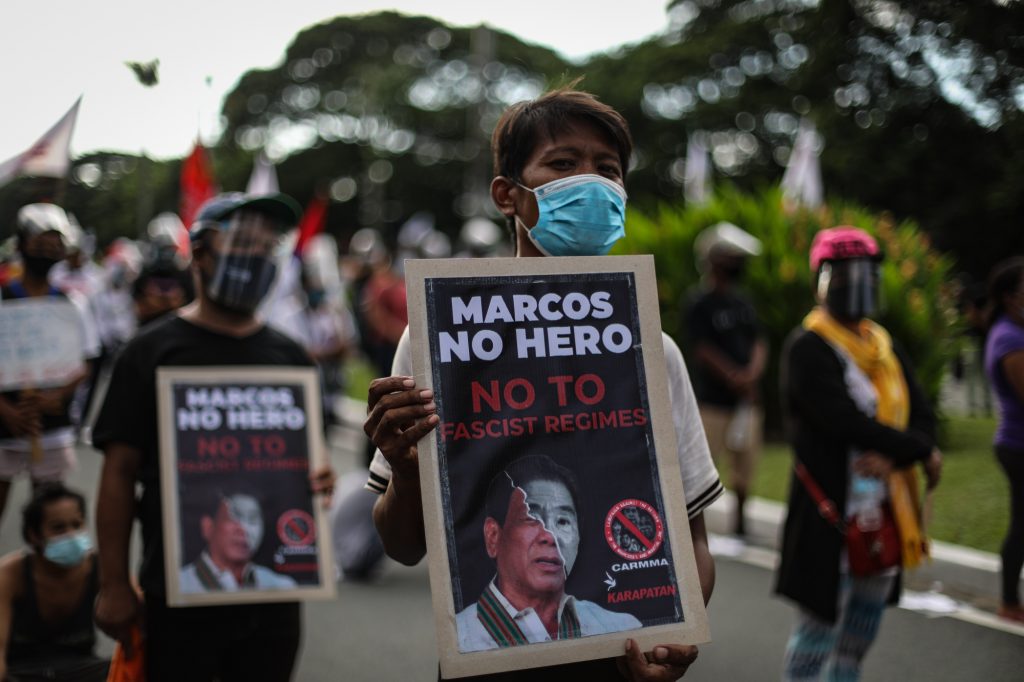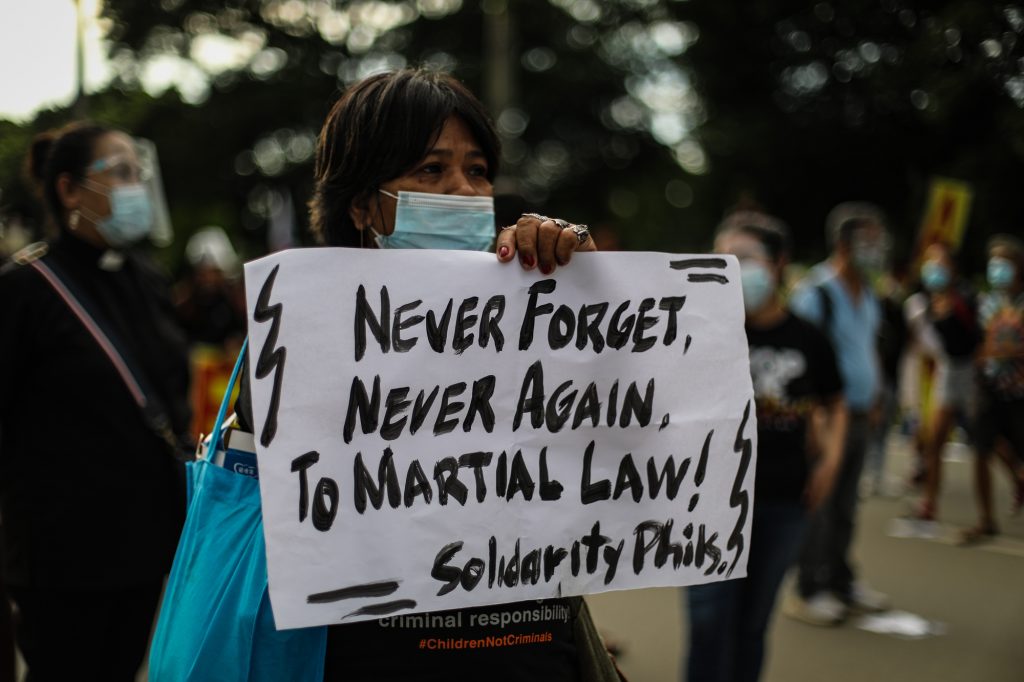
Church and activist groups across the Philippines marked the 48th anniversary of the declaration of martial law in 1972 with protests amid strict quarantine measures due to the pandemic.
In protest gatherings held in several cities, various groups said the anniversary of the declaration of martial law on September 21 serves as a reminder that atrocities continue to this day.
The martial law years under former dictator Ferdinand Marcos were considered to be the darkest years of the country with about 70,000 people imprisoned, 34,000 tortured, and 3,240 killed.
In a statement, the Association of Major Religious Superiors in the Philippines (AMRSP) said Marcos’ declaration of martial law “ushered in an unprecedented reign of terror and unbridled greed.”
“Suddenly, the whole country was plunged into darkness and uncertainty,” read the statement released by the influential religious organization on September 21.
“We raised our voices when repression reared its ugly head,” said the religious superiors.
“We in the AMRSP and our predecessors committed ourselves to be prophets and witnesses to a church of and for the poor,” they added.
Because of their active participation in advocating for the rights of people through street protests and and even in workers’ strikes, “we were vilified, demonized, and many of our members arrested, tortured, and even killed.”
“The church and its people were persecuted,” recalled the church group.
“Yet to keep us going, we celebrated the courage and resistance of a people despite all the threats, arrests, detention, torture, disappearance and salvaging still stood their ground and defied the dictatorship until it was driven away,” said the group.

Tyranny on the rise again
About five decades after the declaration of martial law, the AMRSP warned that a “tyranny is on the rise” again.
“Now we weep again for the more than thirty thousand human beings arbitrarily killed in this war on drugs,” said the group in its statement.
“The orphans and widows demand justice. We demand accountability and justice,” it added.
“We are appalled again by continuing attacks on human rights defenders and all those who serve the least, the last and the lost,” said the church leaders.
They noted that a “culture of death is being glorified” with the continuing perpetration of the “war on drugs” that have reportedly claimed thousands of lives.
The AMRSP also cited moves to revive capital punishment and the “large-scale corruption” allegedly committed by allies of those in power.
“On this day we pray to the God of liberation and renew our commitment to serve the voiceless and dehumanized, to a faith that does justice and makes for peace,” read the statement.
In its statement, human rights group Karapatan called for an end to what it described as a “de facto martial law” under the administration of President Rodrigo Duterte.
“Ripping pages straight from the playbook of Marcosian fascist dictatorship, Duterte has built around him a virtual military junta of retired generals with bloody track records of human rights violations,” read the group’s statement.
“We have seen this all before, and the ending should none other than be the dismantling of Duterte’s fascist dictatorship,” said the group.
The August Twenty-One Movement, one of those that led the anti-dictatorship protests in the final years of the Marcos dictatorship in the 1980s, called on Filipinos “to be vigilant against an apparent drift against democracy” under the current administration.
“Another peril that we should guard against is the move of this administration to scuttle our democratic institutions and declare a revolutionary government,” read the group’s statement released on September 20.

Historical revisionism
The Philippine Ecumenical Peace Platform, meanwhile, said it is “unfortunate” that the Philippine government “is failing in its obligation to affirm peace as our sacred right.”
The group of religious leaders of various faiths in the country said the current political leadership “has encouraged historical revisionism favoring the late dictator Ferdinand Marcos.”
The church group said the government has thrown away the results of the talks with the communist-led National Democratic Front of the Philippines and its allied organizations.
It decried that used of government funds for government offices that have become “notorious for its rampant red-tagging” and “vilifying even church organizations, church leaders and members.”
The group Akbayan called on people to resist “historical revisionism” and not to allow the Marcoses to “rob us of our truth and history.”
The group accused the Duterte administration of trying to “obscure the truth,” such as the hero’s burial granted to Marcos on Nov. 18, 2016, and the attempt to pass a bill making the dictator’s birthday a holiday.
“Even if the truth is stubborn and history never forgets, they still need defending,” said the political organization.
Former president Marcos announced that he had placed the entirety of the Philippines under martial law on Sept. 23, 1972, marking the beginning of a 14-year period of one-man rule.
Although the formal document proclaiming martial law – Proclamation No. 1081, which was dated September 21, 1972 – was formally lifted on January 17, 1981, Marcos retained essentially all of his powers as dictator until he was ousted in 1986.
When he declared martial law in 1972, Marcos claimed that he had done so in response to the “communist threat” posed by the newly-founded Communist Party of the Philippines and the “rebellion” in Mindanao.
Source: Licas Philippines
0 Comments